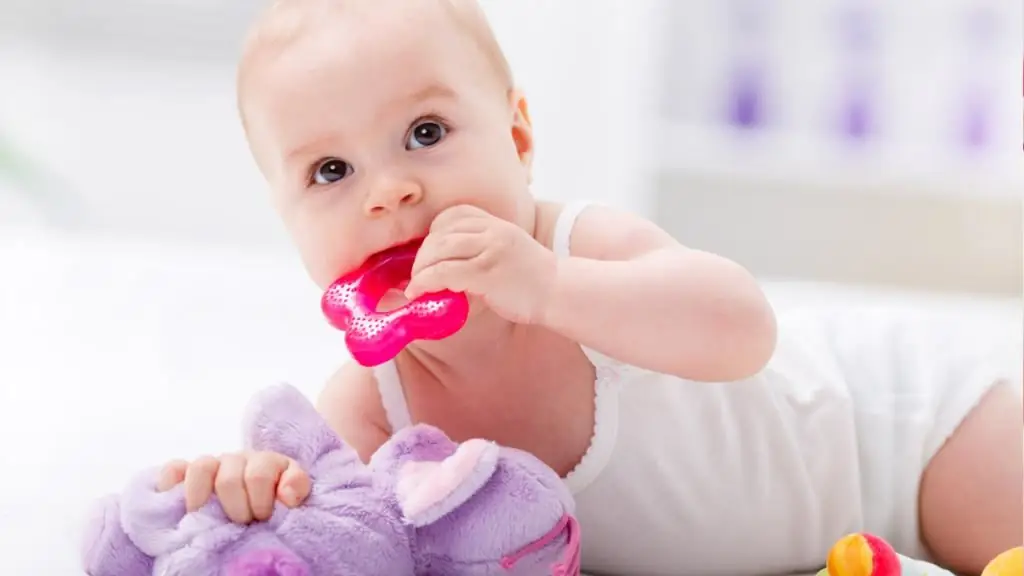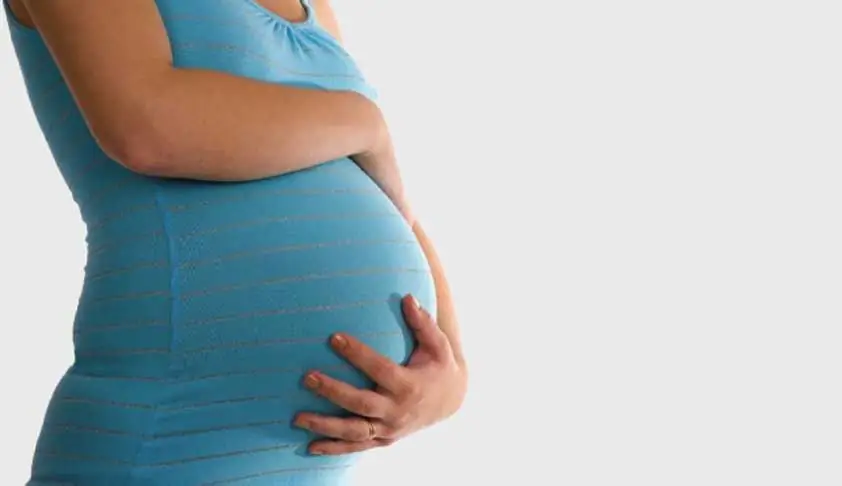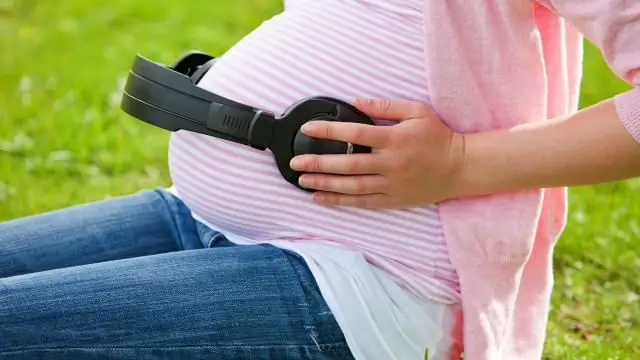2026 Author: Priscilla Miln | miln@babymagazinclub.com. Last modified: 2025-01-22 17:55:18
From the first days of life, the baby is under the constant control of the parents. Behavioral reactions, actions and grimaces of the child can tell a lot about the state of his he alth, development and mood. Often, adults notice that the baby rubs his eyes. The reasons for this may be different. If the baby rubs his eyes before or after going to bed, do not worry. However, the constant repetition of such actions requires special attention from parents.
When you don't need to worry
Children may rub and scratch their eyes for the following reasons:
- Baby wants to sleep. In this case, you should not worry, as this is a common reaction to fatigue.
- If a baby rubs his eyes and nose, scratches his ears, then most likely he is teething. During this period, children become capricious and irritable, their stools may change, their temperature rises and their appetite disappears.
- When there is a sharp change of darkness and light, the baby can also rub his eyes.
- Change in daily routine can also provoke periodic itching of the baby's eyes.
- Water, soap, shampoo or foam can get in your baby's eyes while bathing. Even after bathing, the irritant remains on the mucous membrane for some time, which causes itching of the eye.

Foreign body hit
The most common reason why a baby rubs his eyes is when a foreign object gets into them. Even an eyelash or a grain of sand can cause an unpleasant sensation of discomfort. Do not forget that the presence of the smallest object in the baby's eye can cause a lot of complications. The child will reflexively try to get rid of the foreign body, start scratching his eyes with his hands and be able to infect. Therefore, parents should constantly monitor the hygiene of the hands of the baby. You need to be especially careful when playing with sand in a children's sandbox. Dirty sand can cause serious eye conditions that require medical treatment.
If a grain of sand or a speck gets into the baby's eye, the procedure for parents is as follows:
- examine the eye and identify its location;
- rinse eyes with boiled water or weak tea.
If a large foreign body or parents cannot cope with the problem on their own, then it is better to contact an ophthalmologist as soon as possible. Your attempts to remove the object can cause pain and only harm the child, whilewhile a specialist will deal with these quickly and painlessly.
Allergy
A common reason that a baby rubs his eyes in sleep and while awake is the development of an allergic reaction to medicines, dust, food, animal hair, and so on. In this case, in addition to scratching the eyes, you can notice symptoms such as nasal congestion, sneezing, swelling and redness of the eyelids, itching. Treatment of the disease consists primarily in removing the allergen and taking antihistamines prescribed by the pediatrician.

Warning signs
Parents should remember that frequent eye scratching can be caused by a serious pathology. Alarming symptoms that explain why babies rub their eyes are as follows:
- redness and swelling of the eyelids;
- lacrimation;
- appearance of discharge from the eyes;
- itch;
- sticky eyes after sleep.
The presence of these symptoms may indicate the onset of inflammation, allergies or infection.
Eye inflammation
This pathology is diagnosed in infants quite often and can take the following forms:
- barley;
- inflammation of the eyeball, tear ducts or eyelid;
- furuncle.

With any of these diseases, the baby constantly rubs his eyes, he has symptoms such as lacrimation, redness of the eyelid, swelling, profuse discharge (usually purulent), itching and pain in the eyelids, increased photosensitivity, possibly worseningvision and fever. If these symptoms appear, you should immediately consult a doctor and conduct an examination. It is important for parents to remember that self-medication should not be done. This can lead to a worsening of the situation and provoke the development of complications.
Conjunctivitis
This disease is characterized by inflammation of the conjunctiva of the eye due to a bacterial or viral infection, as well as allergies. Symptoms of conjunctivitis in infants are:
- itching and burning;
- photophobia;
- sticking eyelids after sleep;
- formation of purulent yellow crusts;
- puffiness and redness of the eye.
In addition, the baby can eat poorly, sleep, becomes capricious and whiny. Now in pharmacies there is a fairly large selection of drugs against conjunctivitis. However, only a doctor can advise individual treatment.

Treatment
If a baby rubs his eyes and is diagnosed with an infection or inflammation, the doctor will prescribe anti-inflammatory or antibiotic therapy. The course of treatment includes taking antiviral drugs or local or general antibiotics. To stimulate the immune forces of the body, babies are prescribed vitamin complexes and medicines that help strengthen immunity. If an allergy is detected, the baby will be prescribed antihistamines and an appropriate diet. In almost all cases, the child will need to rinse their eyes and instill drops.
Washing Rules
So, actionsparents, if the baby rubs his eyes and the doctor recommended washing, there will be the following:
- put baby on changing table or bed;
- take a solution for washing (not hot and not cold, optimally at room temperature);
- moisten a clean swab or cotton swab and gently draw over the eye (it is better to lead to the nose, paying special attention to the corners);
- blot the baby's eye with a napkin dipped in boiled water.
There is another way to wash your baby's eyes. For him, you need a regular medical pipette. First you need to collect the liquid for washing in a pipette, drip into the baby's eye, then turn the baby's head to one side. The liquid itself will flow out through the outer corner. After the procedures, it is necessary to leave the baby in a prone position for 20-30 minutes.

How to properly instill drops
When a baby rubs his eyes with his hands and there is a need to wash and instill drops in his eyes, you need to know the following:
- observe hand hygiene: when performing procedures, hands must be clean, nails short-cut;
- solution and drops should be warm or at room temperature;
- the child must be distracted from the procedure in every possible way so that he is not afraid;
- it is better to sterilize the pipette by boiling it or lubricating it with a special liquid;
- before instillation of drops, the baby's eyes need to be rinsed;
- the baby must be put on the back, head tilted back(you can swaddle the baby at this time so that he does not wave his arms);
- when instilling drops, the baby's eyelid needs to be pulled back, drip drops and released, you should avoid touching the mucous membrane of the baby's eye with your own hands;
- after instillation of drops, you can massage the eyelid to make the medicine disperse.
The procedures for instilling drops and washing the eyes of a baby are simple. Do not be nervous, worry and rush. A child will not cry and kick if he feels the confidence and calmness of his mother.

Folk methods
On the recommendation of a doctor, you can use a decoction or infusion of medicinal herbs for washing.
- Decoction of medicinal chamomile. To prepare the decoction, you will need the flowers of the plant. A teaspoon of herbs is placed in a glass of boiled water, stirred, poured into a container and boiled over medium heat for 10 minutes after boiling. Then the broth must be cooled and filtered.
- Althea infusion. Althea rhizome must be crushed into powder and put in a glass of boiled water (you will need 1 teaspoon of grass). Infuse the drug for 8 hours under a closed lid. Then strain and use.
- Decoction of eyebright. In 300 ml of boiled water, you need to place two teaspoons of grass and cook for 5-6 minutes. After cooking, the broth is left to cool, and then filtered and used.
You can use ordinary black tea to wash the eye of a baby. To do this, in a glass of boiling water you need to throw no moreone gram of tea leaves. Then the glass must be tightly closed with a lid and left for half an hour. The finished infusion must be filtered and used for its intended purpose.

If the baby rubs his eyes and this is an isolated case, then there is no cause for concern. If the friction is permanent and is accompanied by the appearance of dangerous symptoms, then you cannot do without the help of a doctor. It is important to remember that timely assistance to the baby will greatly alleviate the situation and speed up recovery.
Recommended:
Grasping reflex: concept, definition, norm and pathology, identification of problems, necessary treatment and physical procedures

The infant's grasping reflex is an ancient phylogenetic mechanism. The ability to hold objects in the handles initially leads to the world of games, and then the baby learns to eat on his own. The grasp reflex is innate. By the age of one, this reflex becomes conscious and turns into a coordinated and conscious action. In this article, we suggest that you familiarize yourself with the stages of development of the reflex, identify the causes of a weak or absent reflex
Stone belly during pregnancy: symptoms, causes, consultation with a gynecologist, possible risk and necessary treatment

Pregnancy is a special period in the life of any woman. She listens to the slightest changes in her body, and every new sensation causes anxiety. A stone belly during pregnancy causes the most concern for the expectant mother, she does not understand what to do in this case. This article will describe all the nuances of such a state
Ovarian pregnancy: causes of pathology, symptoms, diagnosis, ultrasound with photo, necessary treatment and possible consequences

Most modern women are familiar with the concept of "ectopic pregnancy", but not everyone knows where it can develop, what are its symptoms and possible consequences. What is ovarian pregnancy, its signs and methods of treatment
How to understand that the uterus is in good shape: a description of the symptoms, possible causes, consultation with a gynecologist, examination and treatment if necessary

Almost 60% of pregnant women hear the diagnosis of "uterine tone" already at the first visit to the gynecologist in order to confirm their position and register. This seemingly harmless condition carries certain risks associated with the bearing and development of the fetus. How to understand that the uterus is in good shape, we will tell in our article. Be sure to dwell on the symptoms and causes of this condition, possible methods of its treatment and prevention
Scabies during pregnancy: symptoms with photos, causes, necessary tests, consultation with a gynecologist, treatment and possible consequences

Carrying a child for 9 months, it is unrealistic to protect yourself from the world around you. Each girl tends to be less in public places and not to visit places with the maximum risk of infection with a contagious disease: clinics, schools, kindergartens. However, in some cases, pregnancy is still overshadowed by an infectious disease. And one of them could be scabies. It is rare during pregnancy, but you need to know about its signs, cure and precautions

